The CBD Expert Series: Discussing Cutting-Edge CBD Research with Pelin Thorogood
Page Overview
Recently, CBD Oil Review CEO Nick Musica sat down with President and Co-Founder of the Wholistic Research and Education Foundation, Pelin Thorogood. A former tech CEO turned social entrepreneur, Pelin has been at the forefront of the cannabidiol (CBD) revolution since the early days.
She first staked her claim in the industry as co-founder of Hawaii-based Mana Artisan Botanics, a high-quality CBD brand that prides itself on using local, organic, and synergistic ingredients. Given her belief that more scientific and clinical data is needed to understand exactly how CBD can benefit people with different health conditions, Pelin capstoned her efforts with the founding of the Wholistic Research and Education Foundation in 2017. At Wholistic, she continues leading the charge by supporting groundbreaking CBD safety and efficacy research, and leverages this evidence-based data for CBD education.
So, who better to tell us about how far CBD research has come, where it will go, and most of all, why we should care?
Who Is Pelin? What Is Wholistic?
Nick Musica (CBD Oil Review): So Pelin, can you tell me a little bit about your background?
Pelin Thorogood (Wholistic Research and Education Foundation): My background is in big data and analytics, the industry I was in for over 20 years as a tech executive. Now, as a social entrepreneur in the CBD and wellness space, I'm leveraging my analytical thinking and engineering mindset to more creatively and comprehensively explore the potential benefits of CBD.
And it sounds like that seems to be the motivation behind starting Wholistic, is that correct?
Yes. I co-founded Wholistic with my friend and business partner Andy Noorda. Both of us had personally experienced the benefits of CBD and in Andy's case, it was truly a life-changing experience.
His son Max was born with cerebral palsy and had experienced massive spasticity his whole life, which interfered with his therapy. When Max turned 11, Andy started using CBD on him after learning out about its anti-inflammatory and anti-anxiety effects. I understand that within minutes of the topical CBD treatment, Max relaxed and opened his tight fist for the very first time. After three years of CBD treatments, Max is now able to throw balls, hug his father, and participate in therapy in a far more meaningful manner than ever before. The improvements to his condition— and the hope this has provided Max’s family—have been just absolutely remarkable.
Once Andy and I started asking our friends and colleagues about CBD a few years ago, well before it was as popular as it is today, we found out many were using CBD for a variety of conditions. Not just epilepsy, which I know many have heard about, but really everything from brain tumors to Parkinson's and Alzheimer's, autism to sleep, and everyday chronic pain. The breadth of the potential benefits was honestly astounding to me!
Our Top Trusted CBD Oil Pick
Joy Organics THC Free Gummies are our top CBD pick because of their potency and delicious flavor. Each gummy contains 10-25mg of organic CBD which helps you tackle whatever stresses life throws at you, on-the go. Interested shoppers can check out Joy Organics Gummies using the native shopping unit below. All purchases are made with and shipped directly from the brand.Just as interesting—especially given my analytics background—was how a lot of others indicated that CBD did not benefit them. They said, ‘Yeah I tried CBD, I heard about all the hype, and it doesn't work for me at all.’
Given both our curiosity and our deep desire to get to the truth, we wanted to really understand how and why CBD may provide these diverse health benefits and why it works for some people and not for others. As we looked into the medical literature, we realized there was simply not a lot of research from NIH [National Institutes for Health] or other sources primarily due to the Schedule 1 status of CBD and cannabis.
Based on what we saw, we thought it was time to bring in private money and resources for much-needed research funding, and decided to start the Wholistic Research and Education Foundation. Our mission is to explore the health benefits of CBD-rich therapeutics with clinical and scientific research, and leverage this evidence-based data for education and advocacy.
Our approach is what some call Venture Philanthropy, which is a model that goes far beyond writing checks. We take a deep, long-term view into what it means to invest in cutting-edge CBD research and education to improve public health and safety.
It sounds like the need that helped to foster the launch of Wholistic is that there were a lot of anecdotal stories about CBD, some of which were full of great results and others not so much. And so to tease out the truth seemed like a good motivator.
That's exactly right. There are a lot of people out there personally vouching for CBD, and there is certainly some scientific information supporting its specific benefits as well. The WHO [World Health Organization] last year came out with a major report that basically deemed CBD as safe and tolerable for humans and animals, indicating there is preliminary evidence that it may be beneficial in treating several serious conditions including Alzeimer’s, Parkinson’s, cancer, and psychosis. The National Academies of Science, Engineering, and Medicine (NASEM) published a similar report in 2017, detailing studies that underscore the potential benefits of cannabis for various conditions.
Our mission is to explore the health benefits of CBD-rich therapeutics with clinical and scientific research, and leverage this evidence-based data for education and advocacy.
In all cases, researchers will state CBD, and cannabis in general, ‘may or may not be’ beneficial because they simply don't have enough data to conclusively prove its effects across these diverse conditions yet. So, we're really hoping to jump into this crazy maelstrom and add our unique perspective, approach, and passion into the mix to explore whether or not CBD works for specific conditions like autism, and if so, how. We want to understand the mechanisms of action so that we can determine why it may work for some and not for others.
You have some help and an advisory board that you and Andy work with. Can you tell me about those folks?
Absolutely. I'm an engineer and a tech executive, and Andy is a renowned philanthropist; neither of us have any medical education or background. So, it was very important for us to make sure we surrounded ourselves with the right people who could help advise us from a medical and scientific perspective, since this is all about cutting-edge research.
We reached out across the country to establish relationships with world renowned doctors, scientists, and researchers to form our Medical Advisory Committee. We also invited policy experts into the group since there's an advocacy element to all this.
We have specialists with backgrounds in a variety of fields, including oncology, endocrinology, neuroscience, pain medicine, and toxicology. They come from some of the most esteemed research institutions, including Columbia University, UCLA, UCSD, University of Utah, and University of Washington.Our amazing Medical Advisory Committee members help provide the unique perspectives we need to help guide the type of groundbreaking studies we wanted to enable.
We need to establish the scientific basis on how and why CBD may be beneficial for so many conditions.
For instance, we’re working with UCSD on an autism study. It was the collaboration of the UCSD research team and our Medical Advisory Committee members that ended up producing this first-of-its-kind, multi-disciplinary study that utilizes clinical, scientific, advanced mathematical, and genetic techniques across a cohort of patients to explore not just if CBD can help autistic kids, but if so, how. It will be the first such systematic and comprehensive exploration of the mechanisms of action of how CBD may benefit autistic kids.
CBD Research 101
How do you keep CBD as a consistent factor throughout the research?
When you're conducting clinical research, especially with a Schedule 1 compound, what's being used in the study has to be first approved by several government agencies. So you cannot simply go out and buy some CBD product online or from a store to use it in a clinical study. The purity and potency of the CBD formulations as well as the safety and rigor of research methodology first goes through an arduous approval cycle.
The exact formulations that are planned for any study, along with the credentials of the companies responsible for the formulation have to be reviewed and approved. The researchers are then very careful to ensure exact titrations, dosage, and delivery frequencies are administered to each patient, as stated in the approved study design. This way, you are following a scientific method and are able to accurately compare and contrast any differences in response from the clinical trial participants.
There are also self-reported observational studies, where the results are not going to be as scientific as a clinical study. With these kind of studies, the participants can buy CBD products from the market, self-administer the CBD and report any relevant physiological and psychological responses, loosely following the protocol given to them. This approach mimics everyday life more closely and provides a broader data set of likely outcomes over time, and is certainly valuable as well. However, it is important to note that observational studies are not regarded as highly by the medical or scientific community as clinical studies since the setting is not as controlled and the conclusions cannot be as firm and free of external factors.
So there are two different methodologies: one of which is hyper controlled, the other is more anecdotal and reported based on someone else's diligence around how they took the product.
Yes, and they both have value. It can be great to start with observational studies at a lower cost, to explore and establish hypotheses, and then leverage the findings in the design of the controlled clinical studies.
If it weren’t for the longitudinal studies that folks have been conducting for years, we wouldn't be doing what we're doing for a living, and there might not be a CBD industry to talk about it at this point.
That's absolutely right. There is plenty of anecdotal evidence out there suggesting CBD benefits everything from chronic pain and insomnia to Parkinson's, glioblastoma, and Alzheimer's. The range of anecdotal data is really stunning, which is exactly why more and more people are trying CBD.
And, that's exactly why it's important for us to do this kind of research, certainly to ensure safety and tolerability, but also to understand efficacy parameters. For example, how much CBD one needs to take for a specific condition, or why CBD works for some people and not for others. That's part of personalized medicine. We need to establish the scientific basis on how and why CBD may be beneficial for so many conditions.

We know the body is covered in cannabinoid receptors, but further research is needed to fully understand CBD's mechanisms of action.
Autism Research at UCSD: CBD and “Mini Brains”
You mentioned CBD research on autism you are involved in, is that complete?
We are just starting as it has taken well over a year for UCSD to receive all the government approvals. We approved and funded this highly unique study in April of 2018. However due to the federal Schedule 1 status of CBD, the series of approvals that are required, not to mention the scarcity of federally approved CBD sources for clinical trials, have led to a long lead-in time .
But let me back up a bit and tell you what we are about to embark on and why, as the UCSD autism study is truly groundbreaking. The hypothesis is that CBD has a number of effects on the central nervous system that may be relevant to autism, including correcting imbalances in certain neurotransmitters, enhancing activity of endocannabinoids, modifying neural network signaling, and protecting against neuroinflammation. The study hopes to answer the question, “Does CBD hold a therapeutic promise for Autism, and if so, via what mechanisms?”
UCSD has now started selecting the patients to enroll into the clinical trial. They are all going to be 8- to 12-year-old boys because autism is four times more likely for boys versus girls. The study is set to start this fall. A highly experienced UCSD clinician with tremendous experience in autism is the principal investigator, or the PI, for the clinical portion of the study and will be overseeing the CBD administration to the kids. The clinical trial will be augmented with genomics and neuroscience elements to explore the mechanics of action for any CBD efficacy for autism—and that’s never been done before!
The study hopes to answer the question, “Does CBD hold a therapeutic promise for Autism, and if so, via what mechanisms?”
Can you tell me about the folks on the ground conducting the research, the doctors, the academics?
Dr. Doris Trauner is one of three principal investigators of the study. She is responsible for the double blind, randomized crossover trial of CBD versus placebo. Dr. Trauner will conduct clinical and neurophysiological evaluations on the participants to determine first and foremost if CBD is safe and tolerable, and also to see if it helps with aggressive behaviors, hyperactivity, or improves social communication.
Drs. Alysson Muotri and Gabriel Silva, the two other PIs of our study, are focused on exploring if the potential mechanism of action of CBD is due to how it affects neurotransmitters, possibly improving brain network connectivity. They will also study biomarkers of neuro-inflamation in these autistic children to see if CBD affects them in any way.
What Dr. Muotri is doing for his part almost sounds like science fiction, as he will be developing mini brains of the kids in the study leveraging a 2012 Nobel Prize-winning procedure called “induced pluripotent stem cell”, or iPSC. iPSC allows him to create thousands of bioidentical mini brains of the kids in Petri dishes where he will be able to conduct a lot of experiments to collect the necessary data on the effects of CBD on neurotransmitters and signaling dynamics. Pretty crazy stuff, but it's amazing. Dr. Muotri runs the stem cell research program at UCSD and is a brilliant, brilliant scientist.
Dr. Silva, another incredible scientist, will analyze signaling dynamics of the autistic brain. He will explore if CBD improves neural network signaling efficiency in autistic kids by conducting advanced mathematical modeling of the tremendous volume of data created from Dr. Muotri’s minibrains.
So we have three unique and very competent PIs, leading the different parts of the study. They are working very closely together so that we have the clinical, stem cell, and neuroscience sides led by experts in their field.
Did you use the phrase “mini brain?”
Yes, the scientific name for this is actually “organoid.” The mini-brain creation process starts by the researchers taking dermis cells from the kids in the study, basically just a small skin sample. Then, they induce these skin cells to become stem cells using the 2012 Nobel-winning procedure I mentioned. Next they induce these stem cells to turn into cortical neurons; then they “feed them” with Dr. Muotri’s special “recipe” to grow them into mini brains in little Petri dishes with built-in EEG wiring. So, the researchers can easily create thousands of mini brains from each patient, in which they can test different CBD titrations and measure any variations in brain activity and signaling rates.
The “min-brain” approach will enable us to study CBD’s effects on the brain in ways that we could never contemplate before because we could never have done a clinical study on thousands of kids or try the various titrations on actual kids.
Note that all the kids in the study are also going to be taking an oral dose of CBD for the clinical trial portion. But with the addition of the mini-brain model, we're going to be able to explore the effects of different doses on each kid in new ways. I think it's going to give us so much more information than just a clinical-only study.
So the mini brains are basically proxies for the human being, and you're trying out CBD on the mini brains?
Correct. it's going to be amazing to be able to compare what's happening in mini brain signaling to actual human behavior, whether the kids are having less outbursts or doing better with communication, because those mini brains have the same genetics as the actual kids in the study.
We're also going to determine whether biomarkers of neuroinflammation are changed by the administration of the various CBD titrations.
The “mini-brain” approach will enable us to study CBD’s effects on the brain in ways that we could never contemplate before because we could never have done a clinical study on thousands of kids or try the various titrations on actual kids.
And so folks who are maybe not so familiar with biomarkers, can you help explain that a little bit?
A biomarker can be broadly defined as “any substance, structure, or process that can be measured in the body and influence or predict the incidence of outcome or disease.” Biomarkers of neuroinflammation refer to the release of certain anti-inflammatory substances from our immune system, or the stimulation of neuroprotective factors, and are used to help determine mechanisms of action.
So, by applying this concept to our autism study, we are trying to correlate any changes in neural network signaling dynamics in the kids’ brains to observable behavioral and communication changes. What's common among the set of kids showing signs of improvement with CBD administration from a neuroinflammatory marker perspective, as well as what's common among those who are not really responding to CBD?
The approach of our multidisciplinary study is truly unique. Nothing like this has ever been done before and the findings may benefit many other neurodevelopmental diseases outside of autism as well. So it's very, very exciting!
Autism Research at University of Utah
You mentioned you are also focused on very unique study at the University of Utah, can you tell us about it?
Yes, In addition to the autism research at UCSD, last year we also embarked on a unique study at the University of Utah to explore the personalized brain effects of CBD and THC. We want to be able to understand how THC and CBD may influence large-scale brain networks involved in attention, executive function, emotion regulation, and cognition. Perhaps even more importantly, we are also exploring why CBD and THC may have different effects for different individuals. The study will use both whole-plant and isolate compounds and should also provide data regarding the entourage effect.
The researchers will first use PET imaging to evaluate how different individuals respond differently to stress and pain and how this affects personalized responses to CBD or THC. Next, fMRI measurements will show changes in connectivity over brain networks affected by THC and CBD, with the goal of determining if CBD and THC affect attention, anxiety, and information transfer rates in the brain.
Similar to the approach of the UCSD autism study we just discussed, there will also be an exploration of any changes to neuroinflammatory and other biomarkers with CBD and/or THC administration.
It's truly a first-of-its-kind study to explore how these compounds may impact various brain functions. I should also note that the study subjects are healthy adults, so we want to first understand how these personalized brain effects may occur in healthy people so we can use that as a baseline for various disease conditions in future studies.
We believe this study has the potential to shape the developing field of cannabinoid therapy.
Future Research and Getting Involved
Both studies you shared are truly fascinating! What’s next on the horizon regarding other research projects you might be supporting? I'm trying to understand how a health condition becomes priority for the Wholistic Research and Education Foundation.
Our key selection criteria is to pick conditions that affect broad populations or may impact our society in major ways. We also want to be opportunistic, adding on precision medicine dimensions to existing clinical-only studies to explore the more personalized effects of CBD. Once we have those elements, our next requirement is engaging with top-notch institutions that have a track record for conducting cutting-edge medical and scientific research. The reputation of the university and the reputation of the principal investigator are very, very important.
So, currently our three primary areas of focus are opioid addiction, insomnia, and neuropathy.
Why opioid addiction? These days you cannot cannot look at a newspaper without reading something about the opioid crisis. Opioids have taken more lives than car accidents in the past year, which is just insane. And, their devastating impact goes far beyond just the users or even their families, as it affects entire neighborhoods and communities. Since chronic pain and inflammation are some of the primary reasons opioids are prescribed, we want to explore whether CBD can deliver similar benefits, at least in some instances, and can be used instead of opioids. We also want to determine if CBD and/or THC can somehow bind with opioid receptors, reducing cravings in users.
In terms of insomnia, tens of millions of people are suffering from insomnia and turning to over-the-counter medication to get some shut-eye. However there is research that shows that while many of these sleep medications may knock you out, the sleep you get doesn’t really deliver all the health benefits of a good night’s rest. Basically when you are on many of the most commonly prescribed sleep meds, you're not getting all the immunity boosting and hormonal balancing benefits that take place when you sleep without medication.
Based on all the anecdotal evidence and the massive size of the impacted population, we believe there is great value in exploring CBD efficacy for insomnia and other sleep-related functional impairments, and to determine if it can indeed deliver benefits without creating any kind of daytime sedation. We also want to determine if CBD can create that ideal resting state, delivering the true restorative value of a good night’s sleep.
So, currently our three primary areas of focus are opioid addiction, insomnia, and neuropathy.
Last but certainly not least, the other area that we're very interested in working with is understanding how CBD may help with neuropathy, especially neuropathy that is induced by chemotherapy. Neuropathy is one of the most common side-effects of chemo, affecting nearly 30-40% of the patients. Sometimes the nerve pain is so unbearable, the patients cannot continue with the chemotherapy
There is evidence that shows that CBD and CBD in connection with THC may significantly reduce these neuropathy symptoms so that the patients can continue with chemotherapy. This is a great example of how traditional and alternative medicine may work in tandem to be far more effective for patients in need. So, I'm very excited to explore if CBD can indeed augment the effectiveness and tolerability of chemotherapy.
So, tell us, how can we get involved? How can others support the efforts of the Wholistic Research and Education Foundation?
Thank you for asking that. We are a federally approved 501(c)(3), in other words a public nonprofit, where anybody can donate and get a tax deduction.
We work with philanthropists primarily, but businesses can donate as well, whether or not they are directly involved with CBD. At the end of the day the research findings are about advancing the industry, with a focus on getting the much needed safety and efficacy data on how and why CBD may be beneficial for a variety of health conditions.
The funding is not only directed towards research, but also used to educate the public and health care professionals on the potential risks and benefits associated with CBD. Given the increasing public interest in CBD as a potential remedy, and the scarcity of the supporting clinical or scientific data, I believe our collective efforts can really advance public safety while also expanding new treatment options with evidence-based data.
More Expert Series Interviews
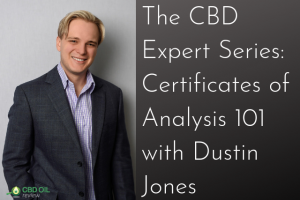
The CBD Expert Series: Jackie Bowen on Mislabeled & Misleading CBD Oil
Read More
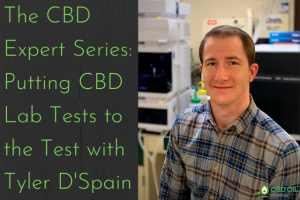
The CBD Expert Series: Putting CBD Lab Tests to the Test with Tyler D'Spain
Read More

MasterChef Nick Nappi's CBD Apple Cider Donut Hole Recipe
Read More
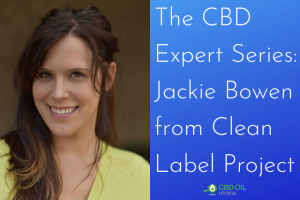
The CBD Expert Series: Jackie Bowen from Clean Label Project
Read More

The CBD Expert Series: Certificates of Analysis 101 with Dustin Jones
Read More
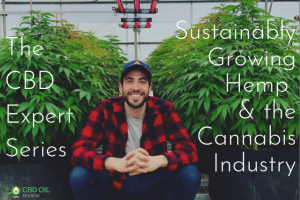
The CBD Expert Series: Sustainably Growing Hemp & the Cannabis Industry
Read More
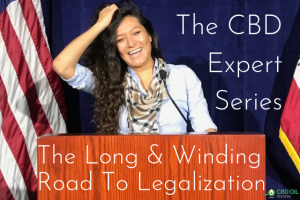
The CBD Expert Series: The Long & Winding Road To Legalization
Read More
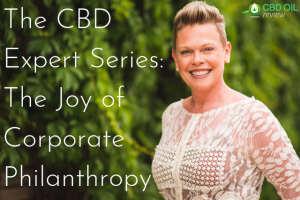
The CBD Expert Series: The Joy of Corporate Philanthropy
Read More
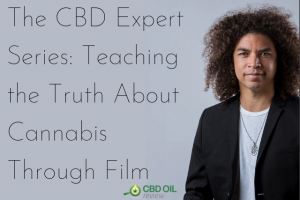
The CBD Expert Series: Teaching the Truth About Cannabis Through Film
Read More
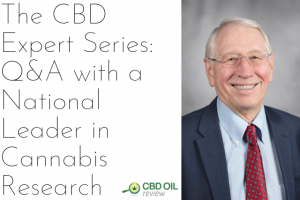
The CBD Expert Series: Q&A with a National Leader in Cannabis Research
Read More
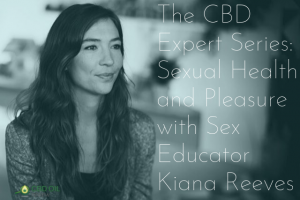
The CBD Expert Series: Sexual Health and Pleasure with Sex Educator Kiana Reeves
Read More
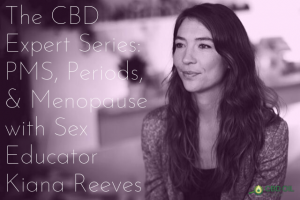
The CBD Expert Series: PMS, Periods, & Menopause with Sex Educator Kiana Reeves
Read More
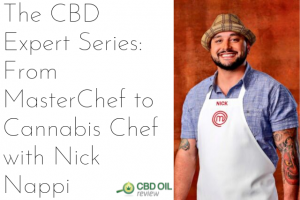
The CBD Expert Series: From Masterchef to Cannabis Chef with Nick Nappi
Read More
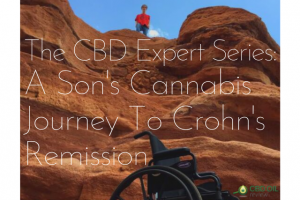
The CBD Expert Series: A Son's Cannabis Journey To Crohn's Remission
Read More
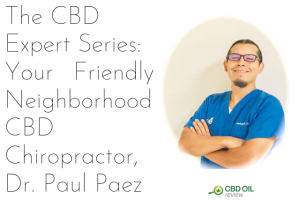
The CBD Expert Series: Your Friendly Neighborhood CBD Chiropractor, Dr. Paul Paez
Read More
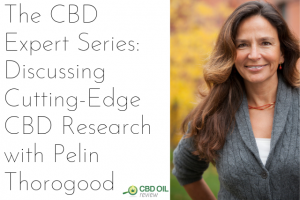
The CBD Expert Series: Discussing Cutting-Edge CBD Research with Pelin Thorogood
Read More
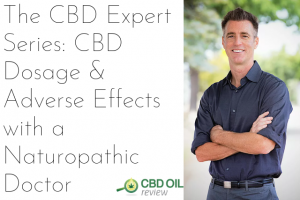
The CBD Expert Series: CBD Dosage & Adverse Effects with a Naturopathic Doctor
Read More

The CBD Expert Series: Talking Drug Tests with a Lab Tech
Read More
Opinions expressed in this article are those of our guest (the interviewee) and not necessarily of CBD Oil Review.
6 Smart Questions to Ask BEFORE You Buy CBD
Get the Ultimate CBD Buyer’s Guide and you won’t look at CBD the same way again!



 search
search